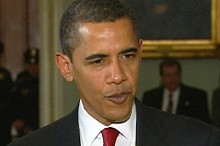First-time purchasers get a tax credit windfall
if they buy before December.
By Les Christie, CNNMoney.com staff writer
Last Updated: February 17, 2009: 12:13 PM ET
A big plus is that the credit is refundable, meaning tax filers see a refund of the full $8,000 even if their total tax bill - the amount of withholding they paid during the year plus anything extra they had to pony up when they filed their returns - was less than that amount. But there has been a lot of confusion over this provision. Adam Billings of
"I will qualify as a first-time home buyer, and I am currently set to get a small tax refund for 2008. Does that mean if I purchased now that I would get an extra $8,000 added on top of my current refund?"
The short answer? Yes,
Scenario 1: Your final tax liability is normally $6,000. You've had taxes withheld from every paycheck and at the end of the year you've paid Uncle Sam $6,000. Since you've already paid him all you owe, you get the entire $8,000 tax credit as a refund check.
Scenario 2: Your final tax liability is $6,000, but you've overpaid by $1,000 through your payroll withholding. Normally you would get a $1,000 refund check. In this scenario, you get $9,000, the $8,000 credit plus the $1,000 you overpaid.
Scenario 3: Your final tax liability is $6,000, but you've underpaid through your payroll withholding by $1,000. Normally, you would have to write the IRS a $1,000 check. This time, the first $1,000 of the tax credit pays your bill, and you get the remaining $7,000 as a refund.
To qualify for the credit, the purchase must be made between Jan. 1, 2009 and Nov. 30, 2009. Buyers may not have owned a home for the past three years to qualify as "first time" buyer. They must also live in the house for at least three years, or they will be obligated to pay back the credit.
Additionally, there are income restrictions: To qualify, buyers must make less than $75,000 for singles or $150,000 for couples. (Higher-income buyers may receive a partial credit.)
Applying for the credit will be easy - or at least as easy as doing your income taxes. Just claim it on your return. No other forms or papers have to be filed. Taxpayers who have already completed their returns can file amended returns for 2008 to claim the credit.
Lukewarm reception
The housing industry is somewhat pleased with the result because the stimulus plan improves on the current $7,500 tax credit, which was passed in July and was more of a low-interest loan than an actual credit. But the industry was also disappointed that Congress did not go even further and adopt the Senate's proposal of a $15,000 non-refundable credit for all homebuyers.
"[The Senate version] would have done a lot more to turn around the housing market," said Bernard Markstein, an economist and director of forecasting for the National Association of Homebuilders (NAHB). "We have a lot of reports of people who would be coming off the fence because of it."
Even so, the $8,000 credit will bring an additional 300,000 new homebuyers into the market, according to estimates by Lawrence Yun, chief economist for the National Association of Realtors.
The credit could also create a domino effect, he said, because each first-time homebuyer sale will lead to two more trade-up transactions down the line. "I think there are many homeowners who would be trading-up but they have had no buyers for their own homes," Yun said.
Who won't benefit, according to Mark Goldman, a real estate lecturer at
One state,
Many may look at the tax credit as a discount on the home price, according to Yun. A $100,000 purchase effectively becomes a $92,000 one. That can reassure buyers apprehensive about purchasing and then watching prices continue falling, he added.
And it provides a nice nest egg for the often-difficult early years of homeownership, when unexpected repairs and expenses often crop up. Recipients could also use the money to buy new stuff for their home - a lawnmower, a rug, a sofa - and, in that way, help stimulate the economy.
Need a job? Find an employment agency near you.





